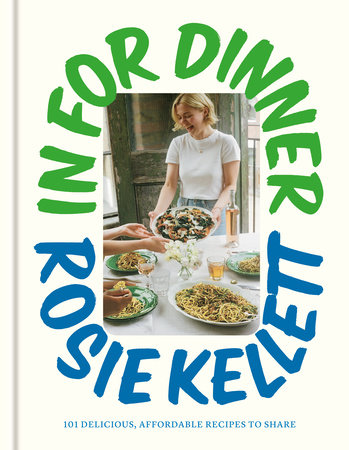IntroductionThis cookbook is a love letter to food, community, friendship, and family. It’s for that big house share who each have their own bottle of olive oil but could so easily be sharing. For couples who love to host their friends and are always looking for an excuse for a dinner party. For families who want to eat delicious, affordable food but get stuck in a rut with the same recipes on repeat. For those people who live alone and want new and interesting ways to feed themselves. It’s for students on a budget, hoping to make their money go that little bit further. This book is for everyone, but the people I have really written it for are those who feel intimidated by cooking for big groups, who shudder at the idea of making pasta for ten on a vacation. I want to give those cooks the confidence to make a casual chili for all their friends on a Wednesday night, because in reality, it’s achievable—and cheaper!—if you know how.
“Who’s in for dinner?” Every day, I, or one of my six housemates, will ask this question on our group chat. We’ve been living communally for five years, cooking, eating, and planning weekly food shops together, each one of us pitching in about $30 for the week. Every night there will be a delicious meal on the table that caters to the needs and dietary requirements of whoever is in for dinner.
This book’s journey to becoming a physical object is an unconventional one, shaped by the way in which we approach home life. It was created with communal living in mind and is filled with recipes inspired by all corners of the globe, representing the international makeup of our house. Our housemates collectively share a heritage that stretches from the UK to Italy, Denmark, Germany, Poland, Southeast Asia, and beyond. The book is a patchwork of staple dinners from the warehouse where my housemates and I reside, my personal family recipes, passed down through generations, and staff food concoctions that have stayed with me well past my shifts in professional kitchens, which I have been working in for the past decade.
When I think of home, I think of food. Of cold hands warmed over the stove, of stacks of hot buttered toast, of crumpets swimming in pools of salted butter, steaming bowls of porridge topped with stewed raspberries while a steady patter of snow falls outside. My fondest memories are punctuated by food—that green onion shrimp pancake my housemate Pier fed me as I collapsed at the warehouse kitchen table, having just moved for the seventh time that year. The macaroni cheese my mum made for dinner in the dead of winter when everyone was tired, hungry, and sad.
When I think of food, I think of community. Of big family gatherings when all the aunties, uncles, and cousins would pile into someone’s living room, kitchen, or hallway to eat until we could eat no more. I think of my Grandma Pat’s baking, her recipes passed down through the family that are a gateway back to my youth; sticky hands, teeth glued together by her “crunch,” and being offered another piece for the drive home. I’m from a big family, one of four kids, just like my parents’ respective families. We are a family obsessed with food: the running joke is that while we’re eating breakfast, we are thinking about lunch, and while we’re eating lunch, we are discussing dinner, and if after dinner we aren’t talking about what we might eat for breakfast the next day, well then, something must be wrong.
Having baked with my grandmas as far back as I can remember, in secondary school I persuaded my mum to let me cook tea for the family one night a week. I grew up calling the evening meal tea, and I always thought this was to do with where I lived, in Derbyshire; however, I have recently learned that it is to do with the British class system (more on this later). My parents are both musicians and often worked in the evenings, so we established a routine whereby once a week I would cook tea while my mum taught cello, so that we could all sit down to eat as soon as she finished. Clever parenting on my mum’s part: this must have been a big help to her, while making me feel like I had won the lottery. Cooking for six soon became second nature.
It’s no surprise, then, just how difficult it was to move to London in 2011, with no friends or community. It was a far cry from eating with a crowd every night, sharing our days with each other, good or bad—while finding my feet in the city, I ended up living alone for the first time in my life and missed the company of others terribly. Thankfully I quickly found work as a nanny and remember vividly how one of the mums I worked for told me that it takes seven (!) years to feel at home in London. At the time I was disheartened, but a decade on, I think she was right. It took me various living arrangements and just over six years to find my spot—through the ensuing years I was also clocking up experience in professional kitchens, from Meringue Girls, where I honed my baking skills, to working as Claire Ptak’s PA at Violet Bakery, and eventually settling in the kitchen team at e5 Bakehouse, where I learned how to scale and cook delicious food for large numbers. I’ve lived all over London; from four years in a guardianship flat on the edge of Hampstead Heath, north London, with a boyfriend who survived on oven fries and BLTs, to a flearidden house in Catford, south London, and a moldering flat share in Walthamstow, northeast London.
And then, one cold and drizzly day in March 2020, off the back of a challenging breakup, I came across a listing for a place in an East London warehouse. In Unit 16, the place I now call home, we’ve eaten and cooked the majority of our meals communally for the last five years. And we have eaten well, my god we have eaten well. What felt like a last resort, an “I’ll take anything” viewing, from the depths of the internet, was soon to become my London home. Little did I know, I was walking into the next chapter of my life, about to meet a group of people who would become the dearest of friends and a way of life that would ultimately lead me to writing the introduction to this book today. These new friends, whom I barely knew, took me in, scooped me up, and nurtured me back to myself again. Living this way gave me a new lease on life. There is a security and a comfort to knowing there is always someone in the house, someone to come home to and share a meal with. As with many big cities, London is undoubtedly a tough place, and it’s only getting harder to build a good life here—without the warehouse I’m not sure I would still be in the city.
Copyright © 2025 by Rosie Kellett. All rights reserved. No part of this excerpt may be reproduced or reprinted without permission in writing from the publisher.
















